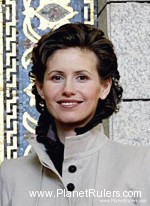Asma al-Assad, First Lady of Syria
Asma al-Assad (Arabic: أسماء الأسد), also known by her maiden name as Asma Fawaz al-Akhras (Arabic: أسماء فواز الأخرس), is the First Lady of Syria. She was born in London, England, on 11 August 1975. Her family is originally from Homs, Syria. She married President Bashar al-Assad in 2000, having previously pursued a career in investment banking.
Born in London on 11 August 1975, Asma is the daughter of prominent Harley Street Consultant Cardiologist Fawaz Akhras and retired diplomat Sahar Otri al-Akhras. Asma finished her schooling from Queen’s College in London, with four A-Levels in Economics, Mathematics, Computer Science and French. She then attended King’s College London and graduated in 1996 with a Bachelor of Science 1st class honours degree in Computer Science and a Diploma in French Literature. After university, Asma started work at Deutsche Bank Group in the Hedge Fund Management division covering clients in Europe and the Far East. In 1998, she joined the Investment Banking division of J. P. Morgan, specializing in mergers and acquisitions for biotechnology and pharmaceutical companies. During her time at JP Morgan she worked primarily from the New York office where she executed four large merger transactions for both European and American clients.
Asma speaks Arabic, English, French and Spanish, and has travelled extensively in the Far East, Europe, the United States and the Middle East. She returned to Syria in the autumn of 2000 and married the President in December 2000. The President and The First Lady of Syria have three children: Hafez, Zein and Karim. Asma is a keen sportswoman, and enjoys cycling, swimming, tennis, badminton and skiing.
As the first lady of Syria, Asma al-Assad operates within a national context for social change, and continues to play a pivotal role in her country’s economic and social development. Promoting active citizenship among Syria’s population is central to the First Lady’s work. She encourages economic and social enterprises that develop skills, self-reliance and community involvement. Her activities have focused on two core areas: ensuring that the recent economic growth in Syria is inclusive to all, especially rural communities; and actively involving Syria’s youth in the country’s development process. Underscoring both challenges is the philosophy that development can only succeed if the direct beneficiaries are actively involved as core players in the process.


